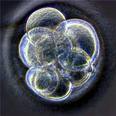The UK is to set up a publicly-funded sperm bank in response to increasing demand and a shortage of donors.
For around £300 – considerably cheaper than the cost of the service at a private clinic – women who make use of the sperm bank will be able to search an online database and choose an anonymous donor on the basis of his ethnicity, height, profession and even hobbies.
The Daily Mail reports that The National Sperm Bank will be based at Birmingham Women’s NHS Foundation Trust, which currently runs an existing NHS fertility clinic and recruits sperm donors from the local population.
Funded by a £77,000 Government grant, the bank will be run by the National Gamete Donation Trust (NGDT) which this year received an additional £120,000 of public money to organise egg and sperm donation.
The move follows a reduction in the number of men willing to become sperm donors after a change to the British regulations which allowed children born through sperm donation to discover their father’s identity when they turn 18. The NGDT hope that having a centralised bank will help to overcome the shortage.
Laura Witjens, NGDT chief executive, said: “There are people who are medically infertile or practically infertile – they want to use donation services in the UK but can’t do so because there isn’t enough donated sperm.
“The [demand from] same-sex couples and single women has grown exponentially. It’s become more socially acceptable to say, I haven’t found a guy yet, don’t want to wait for him, still want a child.”
She added: “The aim is that we will have enough surplus sperm so that we will be able to set up a service for people like single women and same-sex couples, describing this group as ‘customers rather than patients.”
Ms Witjens rejected suggestions that children suffer adverse consequences from the lack of a father figure. “There is no evidence to suggest that children are better off with or without a father,” she said. “There’s never been a call – from us or the Department of Health – to reduce the access to sperm for same-sex or single women. That’s a non-issue.”
Ms Witjens pointed to the removal of the reference to a ‘need for a father’ in the Human Fertilisation and Embryology Act, when taking account of a child’s welfare when providing fertility treatment.
The Bishop of Rochester, Michael Nazir-Ali, raised questions about the new sperm bank. “The most important thing to say is that the needs of any child must be primary. It is the upbringing, welfare and education of the child that should be the prior consideration. It is not enough to ‘want’ a child, let alone one with particular characteristics.
This bank will allow women to choose from profiles of donors, which will include educational attainment and ‘attractiveness’ criteria, raising the spectre of ‘designer babies’, born to the parents’ specifications.
What if the process of pregnancy and birth ‘interferes’ with the desired outcomes? Will such babies then be rejected?”















